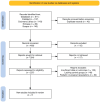Role of Statins in Reducing Cardiovascular Mortality: A Systematic Review of Long-Term Outcomes
- PMID: 40018472
- PMCID: PMC11867218
- DOI: 10.7759/cureus.78137
Role of Statins in Reducing Cardiovascular Mortality: A Systematic Review of Long-Term Outcomes
Retraction in
-
Retraction: Role of Statins in Reducing Cardiovascular Mortality: A Systematic Review of Long-Term Outcomes.Cureus. 2025 Apr 1;17(4):r171. doi: 10.7759/cureus.r171. eCollection 2025 Apr. Cureus. 2025. PMID: 40177229 Free PMC article.
Abstract
Cardiovascular diseases (CVDs) remain the leading cause of mortality worldwide, highlighting the critical need for effective preventive therapies. Statins, or HMG-CoA reductase inhibitors, are widely prescribed for their ability to lower low-density lipoprotein (LDL) cholesterol and reduce CV risk. This systematic review evaluates the long-term impact of statins on CV and all-cause mortality across diverse populations, including those with chronic kidney disease, chronic heart failure, and other comorbid conditions. A comprehensive search of major databases identified randomized controlled trials and large observational cohort studies with follow-up periods exceeding one year. Findings demonstrated significant reductions in CV mortality (hazard ratio (HR) range: 0.38-0.76) and all-cause mortality (HR range: 0.55-0.80) with statin therapy, particularly among high-risk groups, such as individuals with elevated LDL-C and moderate chronic kidney disease. Additional benefits were observed in preventing major adverse cardiovascular events (MACEs). Subgroup analyses revealed variations in efficacy based on age, sex, comorbidities, and statin type or dosage, with some populations, such as those with chronic heart failure and chronic obstructive pulmonary disease, showing limited benefit. Geographic and ethnic diversity were underrepresented in the included studies, and data on long-term effects in populations with advanced renal impairment or inflammatory conditions remain insufficient. These gaps underscore the need for methodologically robust studies and tailored approaches to statin therapy that account for individual patient profiles, including comorbidities and demographic factors. Practical steps include integrating statins with newer lipid-lowering agents and developing personalized treatment protocols to maximize their benefits and minimize risks. This review reinforces the critical role of statins in reducing the global burden of CVDs while emphasizing areas for future research.
Keywords: all-cause mortality; cardiovascular mortality; chronic heart failure (chf); chronic kidney disease (ckd); hmg-coa reductase inhibitors; low-density lipoprotein (ldl) cholesterol; major adverse cardiovascular events (maces); primary prevention; secondary prevention; statins.
Copyright © 2025, Seth et al.
Conflict of interest statement
Conflicts of interest: In compliance with the ICMJE uniform disclosure form, all authors declare the following: Payment/services info: All authors have declared that no financial support was received from any organization for the submitted work. Financial relationships: All authors have declared that they have no financial relationships at present or within the previous three years with any organizations that might have an interest in the submitted work. Other relationships: All authors have declared that there are no other relationships or activities that could appear to have influenced the submitted work.
Figures
References
-
- Bansal AB, Cassagnol M. StatPearls [Internet] Treasure Island, FL: StatPearls Publishing; 2024. HMG-CoA reductase inhibitors. - PubMed
-
- Linton M, Yancey P, Davies S, et al. StatPearls [Internet] Treasure Island, FL: StatPearls Publishing; 2000. The role of lipids and lipoproteins in atherosclerosis.
Publication types
LinkOut - more resources
Full Text Sources

